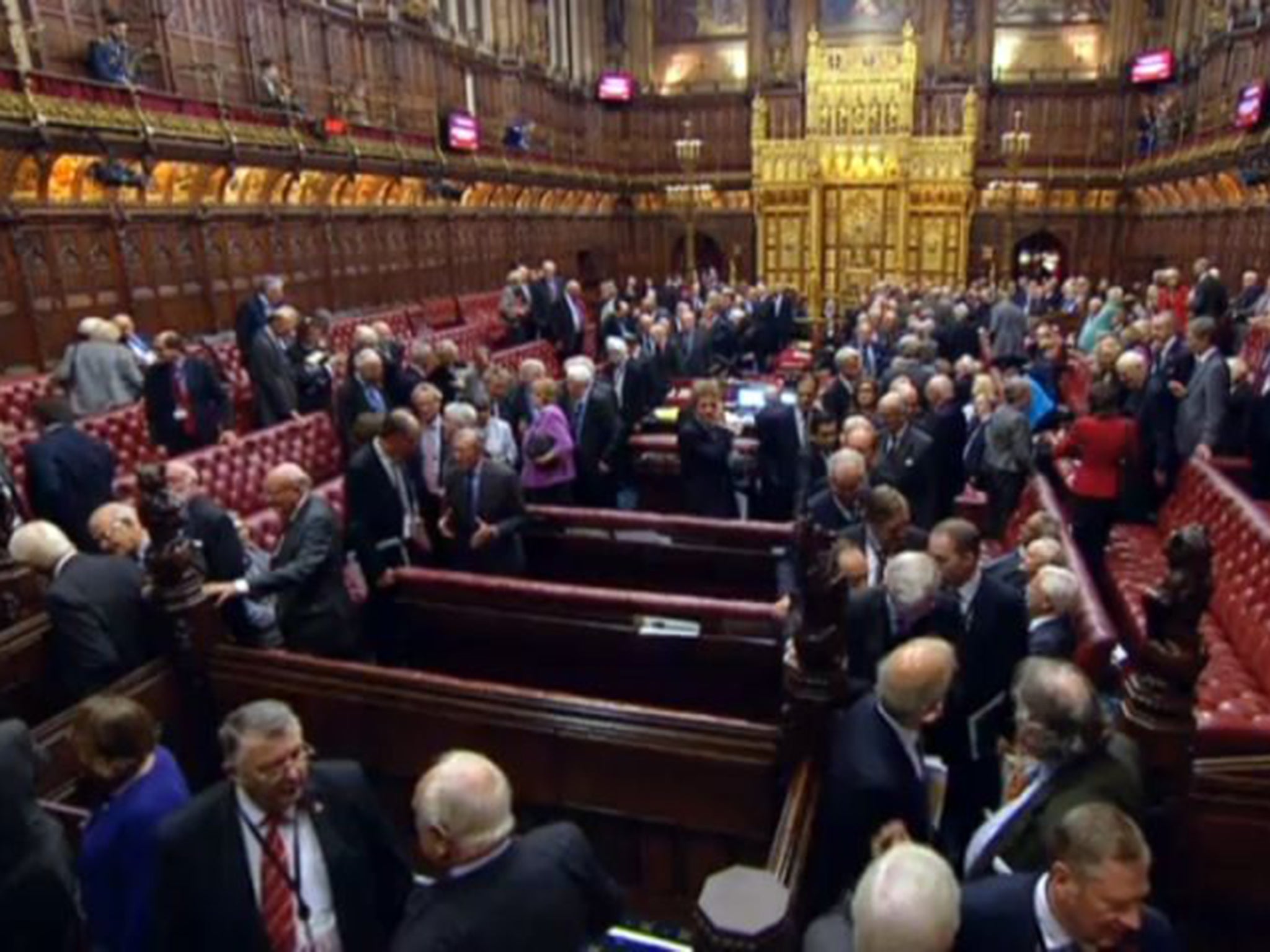Your support helps us to tell the story
From reproductive rights to climate change to Big Tech, The Independent is on the ground when the story is developing. Whether it's investigating the financials of Elon Musk's pro-Trump PAC or producing our latest documentary, 'The A Word', which shines a light on the American women fighting for reproductive rights, we know how important it is to parse out the facts from the messaging.
At such a critical moment in US history, we need reporters on the ground. Your donation allows us to keep sending journalists to speak to both sides of the story.
The Independent is trusted by Americans across the entire political spectrum. And unlike many other quality news outlets, we choose not to lock Americans out of our reporting and analysis with paywalls. We believe quality journalism should be available to everyone, paid for by those who can afford it.
Your support makes all the difference.The House of Lords has voted strongly to reject a sharp planned cut to disability benefits.
Ministers had wanted to cut £30 from the £102.15 rate of Employment and Support Allowance given to people deemed likely capable of work in the future.
New claimants to so-called “Work Related Activity Group” (WRAG) would get the lower rate.
Peers rejected the cut by 283 votes to 198 – a majority of 85 for the opposition, which mainly comprised of Labour, Liberal Democrat, and crossbench peers.
Disability charities have mounted a campaign against the changes. Previous surveys of people in the WRAG have found that over half per believe they would struggle to stay healthy if hit by the cut.
Around a third people getting help from the ESA WRAG also believe they would be unable to heat their homes or eat.
Research commissioned by charities has also previously warned that the reductions will make it more difficult for people with disabilities to move into jobs – a stated goal of the Government.
Crossbench peer Lord Low, who voted against the move, said the cut would create “unnecessary hardship”.
“A drop of £1,500 a year in their benefit income from £5,300 to £3,800 will be catastrophic for many disabled people,” he told peers.
“It will exacerbate poverty among the disabled – a third of working age disabled adults live in poverty already compared with only a fifth of those who are not disabled. The Government's proposals would push many further towards, or actually into, poverty.
“The proposals would cause unnecessary hardship and anxiety to people who have been independently assessed as unfit for work, and the measures are likely to have a disproportionately adverse impact on disabled people.”
Former Health Secretary Lord Lansley however claimed that cutting the benefits would encourage disabled people to get jobs.
“The bigger the gap between income in work and income through benefits, the greater the likelihood for people seeking work and finding it,” he said.
The Government can either accept the peers' amendment or overturn it in the House of Commons.
The defeat came the same day as the Court of Appeal ruled that the Government's bedroom tax was unlawful. It is appealing the decision at the UK Supreme Court.
Elliot Dunster, group head of policy, research and public affairs at disability charity Scope, said the cuts would not achieve the Government’s stated aim.
“We’re pleased the Lords have recognised the impact that cutting Employment and Support Allowance will have on disabled people,” he said.
“Reducing disabled people’s incomes won’t incentivise them to find a job. It will just make life harder.”
Rob Holland, parliamentary manager at Mencap and co-chair of the Disability Benefits Consortium, warned the policy would be self-defeating.
“Disabled people will be hugely encouraged that Peers have listened to their concerns and voted against cutting the Work Related Activity Group (WRAG) of Employment and Support Allowance (ESA),” he argued.
“The Government wants to get more disabled people into work, but as a sector we have warned that cutting ESA WRAG, and its equivalent payment in Universal Credit, will directly undermine that commitment whilst pushing disabled people further from work and closer to or into poverty.
Michelle Mitchell, the chief executive of the MS Society, said the Government should back down.
“We’re delighted Peers have seen sense and defeated the government’s plans to reduce Employment and Support Allowance for people in the Work Related Activity Group,” she said.
“More than 100,000 people are living with multiple sclerosis in the UK and many of them would be hit hard if these changes go through. We urge the government to now think again.”
A DWP spokesman said: “Our reforms are focused on ensuring people get the best support possible. The vote in the House of Lords is a routine part of the legislative process and next steps will be announced in due course.”

Join our commenting forum
Join thought-provoking conversations, follow other Independent readers and see their replies
Comments